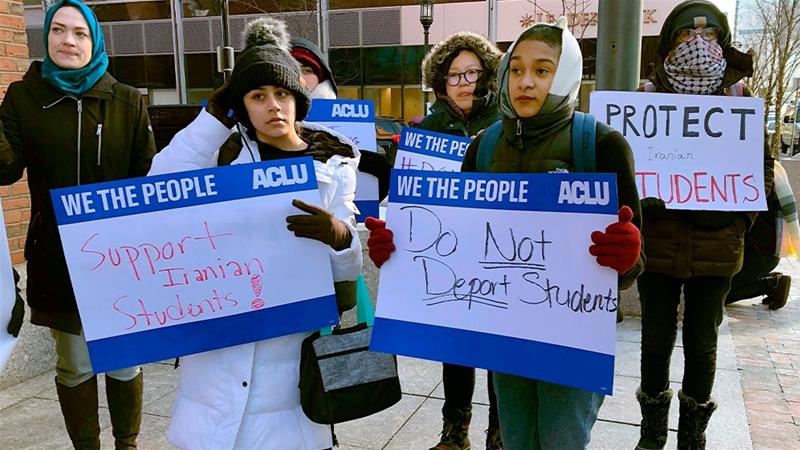A mad dash to collect documents, two overseas trips, a nerve-racking interview followed by months of anxious waiting. After securing admission to some of the world's most prestigious universities, this is the gruelling and costly process Iranian students go through to obtain a student visa to the United States.
But since August, at least 17 Iranian students have had their dream of studying in the US dashed after landing in US airports, valid visas in hand. They were instead sent home and most were given five-year bans on returning to the US, after Customs and Border Protection (CBP) officers deemed them "inadmissible", a label immigrant rights advocates say is broad and can be used at the customs officers' discretion.
Immigration lawyers said the trend began last year but has intensified in recent weeks amid high political tensions between the US and Iran, after the administration of US President Donald Trump ordered the killing of Iranian General Qassem Soleimani on January 3.
Reihana, who wished to be referred to by her first name only, boarded a plane from Tehran to Boston, Massachusetts last September, excited at the prospects of beginning her Master's programme at the Harvard Divinity School.
But when the 35-year-old landed in Logan airport, she was pulled aside by CBP officers for additional questioning. She was led to a separate room where she was asked questions about her travels, work experience, family, studies and her Iranian mobile phone number. Then, an officer searched her luggage and asked her about a Quran that she was carrying.
She said she was then asked about what Iranians think about the explosion in Saudi Arabia, referring to the September 14 drone attacks on two major Saudi Arabian oil facilities. Yemen's Houthi rebels claimed responsibility.
"I said I was packing my things during the past days, and I hadn't been reading or following the news," Reihana recalled. "I explained I didn't know much and that people generally hoped the situation would get better."
Afterwards, she says officers took her laptop and mobile phones and asked her to give them her passwords, which she did.
After more than eight hours of questioning, waiting, demands to sign a form she could not fully understand, fingerprinting and having her picture taken - she was on a flight back to Iran. She said during the entire time her requests to contact her family and university officials were denied.
"I went through one of the worst experiences of my life," she said. "It was truly traumatic."
After inspecting the document she refused to sign, Reihana says customs officers deemed she had "immigrant intent", or planned to overstay her student visa and live in the US - an accusation she said is "completely false".
"I have invested a lot of time and effort in finding the opportunity to study at my dream programme," she said.
"Had I intended to come to the US and stay longer-term, I would have applied to many more programmes - not just a highly competitive programme that I had only a slim chance of being accepted into," she told Al Jazeera.
In a letter addressed to the US State Department, Maureen Martin, director of Immigration Service in the Harvard International Office said that she called CBP at Logan Airport on the evening that Reihana was due to arrive to inquire about her whereabouts and avoid that she be subject to a five-year ban.
"We take seriously the routine audits conducted of our office and strive to maintain the highest standard to ensure we are complying with the law and that we are properly preparing students for the requirements of the student visa," Martin wrote in her statement.
"Based on my review of Reihana's application it did not appear there was any particular information that would support the notion that she intended to come to the United States for any other reason but to study," she said.
SOURCE: ALJAZEERA



